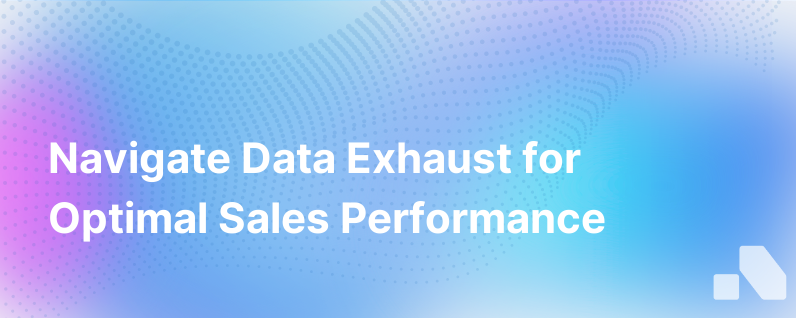
In today's digital economy, every action online generates data. When customers interact with products, sales platforms, and websites, they leave behind trails of digital breadcrumbs. This digital trail is often referred to as data exhaust — a term that encapsulates the vast and varied stream of user-generated data that's typically unstructured and raw, akin to the by-product of an engine.
Although named exhaustively, this data isn't waste at all. It's a goldmine of insights if collected, analyzed, and optimized properly. For sales teams looking to maximize efficiency and drive performance, harnessing data exhaust can provide a clear-eyed view into the customer journey, exposing opportunities for growth and fostering enhanced decision-making processes.
Understanding Data Exhaust in Sales
Data exhaust can include web logs, email correspondences, social media data, sensor data, and much more. In sales, this data encompasses interactions such as email opens and clicks, website visits, time spent on pages, social media engagement, webinar attendance, and product usage metrics, just to name a few.
Each of these interactions tells a story about prospect behavior and preferences. However, for many organizations, this data is scattered across various tools and platforms, making it challenging to harness for actionable insights. That’s where a focused approach to mining and understanding data exhaust comes into play.
Mining Data Exhaust for Sales Insights
Mining data exhaust for actionable intelligence isn't an easy feat. It requires both technological resources and a strategic framework. Here are steps in which businesses can start turning their data exhaust into a strategic asset:
-
Data Aggregation: Firstly, aggregating disparate data into a single repository or platform is essential. This includes integrating CRM systems, marketing automation tools, website analytics, social media insights, and other relevant data sources.
-
Data Cleaning: Not all data is created equal. Companies need to sift through their data exhaust to correct inaccuracies, remove duplications, and filter out irrelevance, which otherwise can skew analytics and insights.
-
Data Analysis: With clean data in hand, the application of analytics tools and techniques comes to the fore. Here pattern recognition, trend analysis, and predictive analytics help identify actionable insights from within the data.
-
Visualization and Reporting: To ensure sales reps and managers can intuitively understand and act on data insights, visual dashboards, and reports are key. These tools can surface trends, hot leads, sales cycle lengths, and much more in a digestible format.
It’s important to note that the efficiency and effectiveness of this process largely depend on the technologies and platforms used. In other words, the right tools make all the difference.
Leveraging Data to Optimize Sales Strategies
What does this process look like in the context of real-world sales strategies? Let’s consider a few possibilities:
-
Lead Prioritization: By analyzing data exhaust, sales teams can score leads more accurately. For example, a prospect that frequently visits high-intent web pages or engages with content may be scored higher than one who shows sporadic, low-engagement activity.
-
Persona Tailoring: Behavioral data gives sales and marketing teams the fodder to fine-tune their buyer personas. These enriched personas allow for more targeted and personal outreach campaigns.
-
Sales Cycle Optimization: Understanding the path prospects take can spotlight bottlenecks in the sales cycle. Data exhaust analysis can trigger process improvements and training opportunities.
-
Content Performance: Sales content should evolve based on performance. By tracking how prospects interact with content, sales teams can understand what resonates and adjust their collateral accordingly.
-
Predictive Insights: By looking at historical data, sales teams can predict future behaviors and trends. This foresight can inform everything from inventory management to market expansion strategies.
The Role of AI in Harnessing Data Exhaust
Given the volume and complexity of data exhaust, AI plays a crucial role in optimizing this information for sales success. AI-powered tools can process vast amounts of data in real-time, uncovering patterns and providing predictive insights that human analysis might miss.
This is especially relevant for B2B sales, where understanding and responding to a prospect’s digital behavior can fast-track them through the sales funnel. A platform like Aomni uses AI to empower sales teams in this exact capacity, providing a comprehensive suite of AI-driven tools so reps can sell more strategically.
Beyond analysis, AI can automate repetitive tasks based on data insights, such as prioritizing leads or triggering outreach emails, allowing sales reps to focus on the more nuanced aspects of relationship building and deal closing.
The Future of Sales in Data Exhaust Optimization
Looking ahead, the optimization of sales strategies through data exhaust is only going to become more central to business success. As the digital economy evolves, data will continue to mount not just in volume but in value.
Companies that invest in the tools and talent to harness their data exhaust will gain unprecedented visibility into the sales process, forecast with greater accuracy, and tailor experiences in ways that align precisely with customer expectations.
Conclusion
In sum, data exhaust in the realm of sales is more than just a by-product; it’s an informational trove that can streamline operations, personalize marketing efforts, and ultimately boost sales performance. It's important to remember that while data holds power, the true competitive advantage lies in how effectively you channel this data to refine and reinforce your sales strategies. With the aid of AI and analytics, sales teams are better equipped than ever to see clearly through the fog of digital interactions and onto a path of optimized sales outcomes.